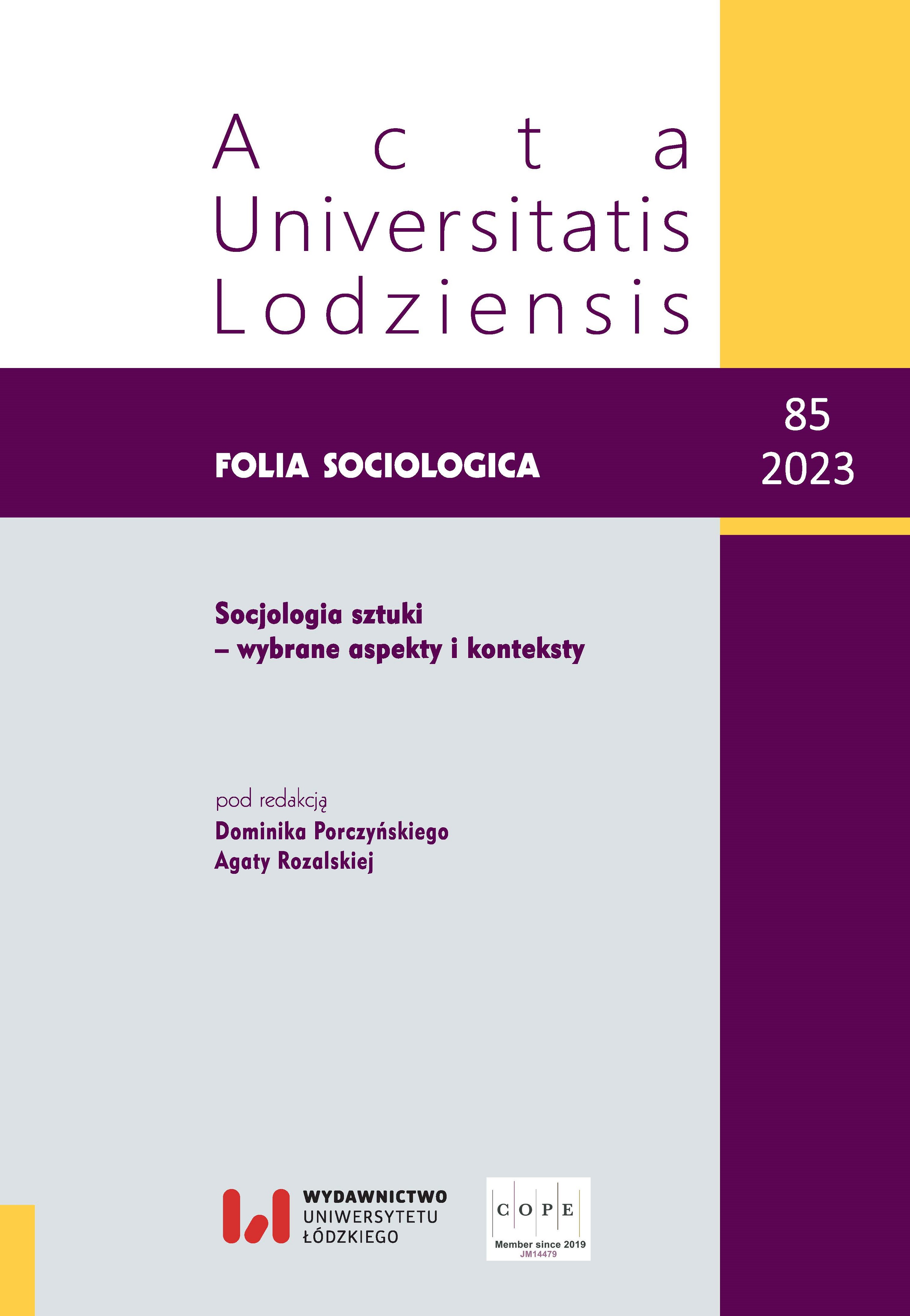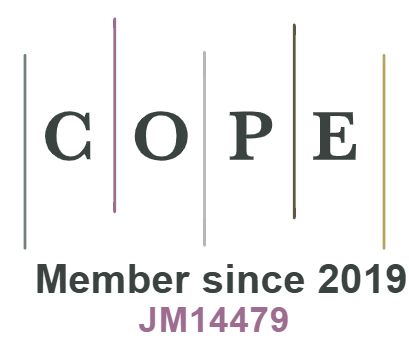Osamotnieni, wyizolowani, autowykluczeni? Z czego wynika nieobecność mężczyzn seniorów w instytucjach kultury?
DOI:
https://doi.org/10.18778/0208-600X.85.05Słowa kluczowe:
mężczyźni seniorzy, płeć kulturowa, instytucje kultury, uczestnictwo w kulturze, wykluczenie społeczneAbstrakt
Celem artykułu jest przedstawienie uwarunkowań ograniczonej obecności mężczyzn seniorów w instytucjach kultury w Polsce. W tekście scharakteryzowane zostały kontekst podejmowania przez starszych mężczyzn instytucjonalnej aktywności kulturalnej oraz główne powody, dla których ich skala uczestnictwa w kulturze jest niska. Zasadniczymi czynnikami, które różnicują charakter partycypacji kulturalnej, jest płeć kulturowa oraz wynikające z niej wzorce zachowań i indywidualne strategie adaptacyjne. Wątki te analizowane są w kontekście barier i problemów, jakich doświadczają mężczyźni seniorzy, a także ryzyk związanych z wykluczeniem społecznym w obrębie tej grupy.
Bibliografia
Allain K.A., Marshall B.L. (2020), “It used to be called an old man’s game”: Masculinity, ageing embodiment and senior curling participation, “International Journal of Ageing and Later Life”, no. 14(2), pp. 9–33, https://doi.org/10.3384/ijal.1652-8670.19447
Google Scholar
DOI: https://doi.org/10.3384/ijal.1652-8670.19447
Australian Bureau of Statistics (2019), Participation in Selected Cultural Activities, https://www.abs.gov.au/statistics/people/people-and-communities/participation-selected-cultural-activities/latest-release (accessed: 5.10.2022).
Google Scholar
Bachórz A., Ciechorska-Kulesza K., Czarnecki S., Grabowska M., Knera J., Michałowski L., Stachura K., Szultka S., Obracht-Prondzyński C., Zbieranek P. (2014), Punkty styczne: między kulturą a praktyką (nie)uczestnictwa, Instytut Kultury Miejskiej, Gdańsk.
Google Scholar
Bachórz A., Stachura K. (2014), Socjologia kultury w obliczu “poszerzenia”. W poszukiwaniu języka opisującego kulturę w transformacji, “Kultura Współczesna”, no. 3(83), pp. 16–26.
Google Scholar
Bachórz A., Obracht-Prondzyński C., Stachura K., Zbieranek P. (2019), Gra w kulturę. Przemiany pola kultury w erze poszerzenia, Instytut Kultury Miejskiej, Gdańsk.
Google Scholar
Bernardo L.D., Carvalho C.R.D. (2020), The role of cultural engagement for older adults: an integrative review of scientific literature, “Revista Brasileira de Geriatria e Gerontologia”, no. 23(6), https://doi.org/10.1590/1981-22562020023.190141
Google Scholar
DOI: https://doi.org/10.1590/1981-22562020023.190141
Bojanowska E. (2014), Activities and lifestyles of elderly people, [in:] S. Grotowska, I. Taranowicz (eds.), Understanding Ageing in Contemorary Poland: Social and Cultural Perspectives, Instytut Socjologii Uniwersytetu Wrocławskiego, Wrocław, pp. 167–178.
Google Scholar
Bredland E., Söderström S., Vik K. (2018), Challenges and motivators to physical activity faced by retired men when ageing: a qualitative study, “BMC Public Health”, no. 18, p. 627, https://doi.org/10.1186/s12889-018-5517-3
Google Scholar
DOI: https://doi.org/10.1186/s12889-018-5517-3
Burn S.M., Ward A.Z. (2005), Men’s Conformity to Traditional Masculinity and Relationship Satisfaction, “Psychology of Men & Masculinity”, no. 6(4), pp. 254–263, https://doi.org/10.1037/1524-9220.6.4.254
Google Scholar
DOI: https://doi.org/10.1037/1524-9220.6.4.254
Centre for Cultural Value (2022), Research digest: Older people – culture, community, connection, https://www.culturehive.co.uk/wp-content/uploads/2022/03/Research-digest-older-people-v1.pdf (accessed: 5.10.2022).
Google Scholar
Chacur K., Serrat R., Villar F. (2022), Older adults’ participation in artistic activities: a scoping review, “European Journal of Ageing”, no. 19, pp. 931–944, https://doi.org/10.1007/s10433-022-00708-z
Google Scholar
DOI: https://doi.org/10.1007/s10433-022-00708-z
Christin A. (2012), Gender and highbrow cultural participation in the United States, “Poetics”, no. 40(5), pp. 423–443, https://doi.org/10.1016/j.poetic.2012.07.003
Google Scholar
DOI: https://doi.org/10.1016/j.poetic.2012.07.003
Connell R. (2005), Masculinities, University of California Press, Oakland.
Google Scholar
Culture Track (2022), Untapped Opportunity: Older Americans & the Arts, https://s28475.pcdn.co/wp-content/uploads/2022/06/CCTTUntappedOpportunity.pdf (accessed: 5.10.2022).
Google Scholar
Czarnecki S., Dzierżanowski M., Grabowska M., Knera J., Michałowski L., Obracht-Prondzyński C., Stachura K., Szultka S., Zbieranek P. (2012), Poszerzenie pola kultury. Diagnoza potencjału sektora kultury w Gdańsku, Instytut Kultury Miejskiej, Gdańsk.
Google Scholar
Czekanowski P. (2012), Społeczne aspekty starzenia się ludności w Polsce. Perspektywa socjologii starości, Wydawnictwo Uniwersytetu Gdańskiego, Gdańsk.
Google Scholar
DiBello J., Murphy L., Palacios I. (2020), Social Integration and Community Health Participation of Elderly Men in Peri-Urban Ecuador, “Annals of Global Health”, no. 86(1), pp. 1–10, https://doi.org/10.5334/aogh.3020
Google Scholar
DOI: https://doi.org/10.5334/aogh.3020
Domański H., Przybysz D., Wyrzykowska K.M., Zawadzka K. (2021), Dystynkcje muzyczne. Stratyfikacja społeczna i gusty muzyczne Polaków, Wydawnictwo Naukowe Scholar, Warszawa.
Google Scholar
Drozdowski R., Fatyga B., Filiciak M., Krajewski M., Szlendak T. (2014), Praktyki kulturalne Polaków, Wydawnictwo Naukowe Uniwersytetu Mikołaja Kopernika, Toruń.
Google Scholar
Fancourt D., Steptoe A. (2019), Cultural engagement and mental health: Does socio-economic status explain the association?, “Social Science & Medicine”, no. 236, https://doi:10.1016/j.socscimed.2019.112425
Google Scholar
DOI: https://doi.org/10.1016/j.socscimed.2019.112425
Fatyga B. (2014), Praktyki kulturalne, [in:] R. Drozdowski, B. Fatyga, M. Filiciak, M. Krajewski, T. Szlendak (eds.), Praktyki kulturalne Polaków, Wydawnictwo Naukowe Uniwersytetu Mikołaja Kopernika, Toruń, pp. 19–26.
Google Scholar
Gallistl V. (2021), Cultural Exclusion in Old-Age: A Social Exclusion Perspective on Cultural Practice in Later Life, [in:] K. Walsh, T. Scharf, S. Van Regenmortel, A. Wanka (eds.), Social Exclusion in Later Life. International Perspectives on Aging, vol. 28, Springer, Cham, https://doi.org/10.1007/978-3-030-51406-8_20
Google Scholar
DOI: https://doi.org/10.1007/978-3-030-51406-8_20
Goulding A. (2018), The Role of Cultural Engagement in Older People’s Lives, “Cultural Sociology”, no. 12(4), pp. 518–539, https://doi.org/10.1177/1749975518754461
Google Scholar
DOI: https://doi.org/10.1177/1749975518754461
GUS (2020a), Jakość życia osób starszych w Polsce, Główny Urząd Statystyczny, Warszawa.
Google Scholar
GUS (2020b), Uczestnictwo ludności w kulturze w 2019 r., Główny Urząd Statystyczny, Warszawa–Kraków.
Google Scholar
GUS (2021), Sytuacja osób starszych w Polsce w 2020 r., Główny Urząd Statystyczny, Warszawa–Białystok.
Google Scholar
Janke M., Davey A., Kleiber D. (2006), Modeling Change in Older Adults’ Leisure Activities, “Leisure Sciences”, no. 28(3), pp. 285–303, https://doi.org/10.1080/01490400600598145
Google Scholar
DOI: https://doi.org/10.1080/01490400600598145
Keaney E., Oskala A. (2007), The Golden Age of the Arts? Taking Part Survey Findings on Older People and the Arts, “Cultural Trends”, no. 16(4), pp. 323–355, https://doi.org/10.1080/09548960701692696
Google Scholar
DOI: https://doi.org/10.1080/09548960701692696
Kiedrzyńska-Tui A. (2015), Seniorzy ocenią kulturę w mieście, https://publica.pl/teksty/seniorzyo-kulturze-w-miescie-52914.html (accessed: 5.10.2022).
Google Scholar
Kisiel P. (2017), Zmiany w polu kultury. Dynamika współczesnych form uczestnictwa w kulturze, [w:] C. Obracht-Prondzyński, P. Zbieranek (eds.), Pomorskie poszerzenie pola kultury.
Google Scholar
Dylematy – konteksty – działania, Nadbałtyckie Centrum Kultury, Gdańsk, pp. 45–59.
Google Scholar
Kluczyńska U. (2011), Czas wolny starszych mężczyzn, [in:] J. Mucha, Ł. Krzyżowski (eds.), Ku socjologii starości. Starzenie się w biegu jednostki życia, Wydawnictwa AGH, Kraków, pp. 83–104.
Google Scholar
Komorowska Z., Perchuć M., Starzyk K., Stokłuska E. (2014), Jak usłyszeć głos seniora? Praktyczny przewodnik po partycypacji obywatelskiej osób starszych, Fundacja Pracownia Badań i Innowacji Społecznych “Stocznia”, Warszawa.
Google Scholar
Kramkowska E. (2014), Aktywność seniorów, [in:] K. Sztop-Rutkowska (ed.), Seniorzy partycypują, Fundacja Laboratorium Badań i Działań Społecznych “SocLab”, Białystok, pp. 46–62.
Google Scholar
Lagaert S., Roose H. (2018), Gender and highbrow cultural participation in Europe: The effect of societal gender equality and development, “International Journal of Comparative Sociology”, no. 59(1), pp. 44–68, https://doi.org/10.1177/0020715217753271
Google Scholar
DOI: https://doi.org/10.1177/0020715217753271
Landsberg P., Poprawski M., Kieliszewski P., Mękarski M., Gojlik A., Kuchta J., Brodniewicz M. (2012), Po co seniorom kultura? Badania kulturalnych aktywności osób starszych, Poznań, https://www.nck.pl/upload/attachments/302557/po_co_seniorom_kultura_raport.pdf (accessed: 5.10.2022).
Google Scholar
Lee C.-W., Lin L.-C., Hung H.-C. (2021), Art and Cultural Participation and Life Satisfaction in Adults: The Role of Physical Health, Mental Health, and Interpersonal Relationships, “Frontiers in Public Health”, no. 8, pp. 582342, https://doi.org/10.3389/fpubh.2020.582342
Google Scholar
DOI: https://doi.org/10.3389/fpubh.2020.582342
Lee J.H., Lee J.H., Park S.H. (2014), Leisure Activity Participation as Predictor of Quality of Life in Korean Urban-dwelling Elderly, “Occupational Therapy International”, no. 21(3), pp. 124–132, https://doi.org/10.1002/oti.1371
Google Scholar
DOI: https://doi.org/10.1002/oti.1371
Lewicki M., Filiciak M. (2017), Wynalezienie poszerzonego pola kultury, “Kultura i Rozwój”, no. 1(2), pp. 7–31, https://doi.org/10.7366/KIR.2017.1.2.01
Google Scholar
Lis B., Popławska M. (eds.) (2020), Seniorzy zależni. Użyteczne rozwiązania dla kadr kultury, Centrum Kultury Zamek, Poznań.
Google Scholar
Luty-Michalak M. (2017), Siła więzi rodzinnych osób starszych, “Uniwersyteckie Czasopismo Socjologiczne”, no. 18(1), pp. 41–49.
Google Scholar
Magala S. (2013), Po co seniorom kultura?, “Studia Kulturoznawcze”, no. 2(4), pp. 25–34.
Google Scholar
Mękarski M. (2013), Jak nas widzą? Jak widzimy siebie? Aktywni seniorzy o sobie i swoim wizerunku, “Studia Kulturoznawcze”, no. 2(4), pp. 131–148.
Google Scholar
Mustonen P., Lindblom T. (2017), Cultural participation and cultural preferences in Helsinki, “Helsinki Quarterly”, no. 1, pp. 82–97.
Google Scholar
Myrczik E., Heikkilä R., Kristensen N.N., Purhonen S. (2022), Missing out on culture–or not: Danes and Finns’ cultural participation, the pandemic, and cultural policy measures, “Nordisk Kulturpolitisk Tidsskrift”, no. 25(2), pp. 1–24.
Google Scholar
DOI: https://doi.org/10.18261/nkt.25.2.4
Nurmi M.A., Mackenzie C.S., Roger K., Reynolds K., Urquhart J. (2018), Older men’s perceptions of the need for and access to male-focused community programmes such as Men’s Sheds, “Aging & Society”, no. 38, pp. 794–816.
Google Scholar
DOI: https://doi.org/10.1017/S0144686X16001331
Płachecki T. (ed.) (2018), Relacje i różnice. Uczestnictwo warszawiaków i warszawianek w kulturze, Teatr Scena Prezentacje, Warszawa.
Google Scholar
Ratzenböck B., Pirker F., Haring N., Maierhofer R. (2022), Aging masculinities in Austria: Social realities and cultural representations, “Journal of Aging Studies”, no. 63, https://doi.org/10.1016/j.jaging.2022.101035
Google Scholar
DOI: https://doi.org/10.1016/j.jaging.2022.101035
Różański T. (2020), Samotność i osamotnienie osób starszych jako problem społeczny i edukacyjny, “Roczniki Pedagogiczne”, vol. 12(48), no. 4, pp. 75–90, https://doi.org/10.18290/rped20124-6
Google Scholar
DOI: https://doi.org/10.18290/rped20124-6
Scottish Household Survey. 2020 Telephone Survey. Culture and Heritage Report. An Experimental Statistics Publication for Scotland (2022), The Scottish Government, Edinburgh, https://www.gov.scot/binaries/content/documents/govscot/publications/statistics/2022/02/scottish-household-survey-2020-telephone-survey-culture-heritage-report/documents/scottish-household-survey-2020-telephone-survey-culture-heritage-report/scottish-householdsurvey-2020-telephone-survey-culture-heritage-report/govscot%3Adocument/scottish-householdsurvey-2020-telephone-survey-culture-heritage-report.pdf (accessed: 5.10.2022).
Google Scholar
SeniorHub. Instytut Polityki Senioralnej (2021), Jakość życia osób starszych w Polsce w pierwszym roku pandemii COVID-19. Raport z badania, https://seniorhub.pl/wp-content/uploads/2021/05/raport-jakosc-zycia-osob-starszych-09.pdf (accessed: 5.10.2022).
Google Scholar
Słowińska S. (2014), O “gettoizacji” aktywności kulturalnej seniorów, “Rocznik Andragogiczny”, no. 21, pp. 271–282.
Google Scholar
DOI: https://doi.org/10.12775/RA.2014.020
Słowińska S. (2019), Aktywność kulturalna osób starszych. Pomiędzy autotelicznością a instrumentalnością, “Dyskursy Młodych Andragogów”, no. 20, pp. 383–396, https://doi.org/10.34768/dma.vi20.33
Google Scholar
DOI: https://doi.org/10.34768/dma.vi20.33
Słowińska S. (2021), Aktywność kulturalna i edukacyjna starszych mężczyzn – obszar nierozpoznany?, “Dyskursy Młodych Andragogów”, no. 22, pp. 61–83, https://doi.org/10.34768/dma.vi22.621
Google Scholar
DOI: https://doi.org/10.34768/dma.vi22.621
Stickley T., Paul K., Crosbie B., Watson M., Souter G. (2015), Dancing for life: an evaluation of a UK rural dance programme, “International Journal of Health Promotion and Education”, no. 53(2), pp. 68–75, https://doi.org/10.1080/14635240.2014.942438
Google Scholar
DOI: https://doi.org/10.1080/14635240.2014.942438
Szlendak T. (2010), Aktywność kulturalna, [in:] W.J. Burszta, M. Duchowski, B. Fatyga, A. Hupa, P. Majewski, J. Nowicki, M. Pęczak, E.A. Sekuła, T. Szlendak, Kultura miejska w Polsce z perspektywy interdyscyplinarnych badań jakościowych, Narodowe Centrum Kultury, Warszawa, pp. 112–143.
Google Scholar
Szlendak T., Goszczyński W., Krajewska K. (2019), Praktyki pozametropolitalne: uczestnictwo w kulturze w małym i średnim mieście, “Studia Socjologiczne”, no. 2(233), pp. 61–98, https://doi.org/10.24425/sts.2019.126140
Google Scholar
DOI: https://doi.org/10.24425/sts.2019.126140
Szukalski P. (2013), Ludzie bardzo starzy we współczesnej Polsce, “Przegląd Socjologiczny”, no. 62(2), pp. 33–54.
Google Scholar
Świderska M. (2015), Obawy związane ze starością, “Pedagogika Rodziny”, no. 5/3, pp. 137–150.
Google Scholar
DOI: https://doi.org/10.1515/fampe-2015-0011
Thompson E.H., Whearty P.M. (2004), Older Men’s Social Participation: The Importance of Masculinity Ideology, “The Journal of Men’s Studies”, no. 13(1), pp. 5–24, https://doi.org/10.3149/jms.1301.5
Google Scholar
DOI: https://doi.org/10.3149/jms.1301.5
Toepoel V. (2011), Cultural participation of older adults: Investigating the contribution of lowbrow and highbrow activities to social integration and satisfaction with life, “International Journal of Disability and Human Development”, no. 10(2), pp. 123–129.
Google Scholar
DOI: https://doi.org/10.1515/ijdhd.2011.027
Watts E. (2015), A Handbook for Cultural Engagement with Older Men, Baring Foundation, Manchester.
Google Scholar
Wieczorkowska M. (2017), Role społeczne współczesnych polskich seniorów w świetle wyników badań, “Acta Universitatis Lodziensis. Folia Sociologica”, no. 61, pp. 77–97, http://dx.doi.org/10.18778/0208-600X.61.05
Google Scholar
DOI: https://doi.org/10.18778/0208-600X.61.05
Woderska N. (2020), Starość czy starości, [in:] B. Lis, M. Popławska (eds.), Seniorzy zależni. Użyteczne rozwiązania dla kadr kultury, Centrum Kultury Zamek, Poznań, pp. 20–24.
Google Scholar
Woolrych R., Sixsmith J., Fisher J., Makita M., Lawthom R., Murray M. (2021), Constructing and negotiating social participation in old age: Experiences of older adults living in urban environments in the United Kingdom, “Ageing and Society”, no. 41(6), pp. 1398–1420, https://doi.org/10.1017/S0144686X19001569
Google Scholar
DOI: https://doi.org/10.1017/S0144686X19001569
Zasacka Z., Chymkowski R. (2022), Stan czytelnictwa książek w Polsce w drugim roku pandemii (2021–2022), Biblioteka Narodowa, Warszawa.
Google Scholar
Zawartka M. (2018), Seniorzy i polityka senioralna w polityce publicznej, “Studia Politicae Universitatis Silesiensis”, no. 22, pp. 49–57.
Google Scholar
Zbieranek P. (2021), Demokratyczna kultura. Proces formułowania polityk publicznych w zakresie kultury, Wydawnictwo Uniwersytetu Gdańskiego, Gdańsk.
Google Scholar
Pobrania
Opublikowane
Wersje
- 31-08-2023 - (2)
- 10-07-2023 - (1)
Jak cytować
Numer
Dział
Licencja

Utwór dostępny jest na licencji Creative Commons Uznanie autorstwa – Użycie niekomercyjne – Bez utworów zależnych 4.0 Międzynarodowe.










